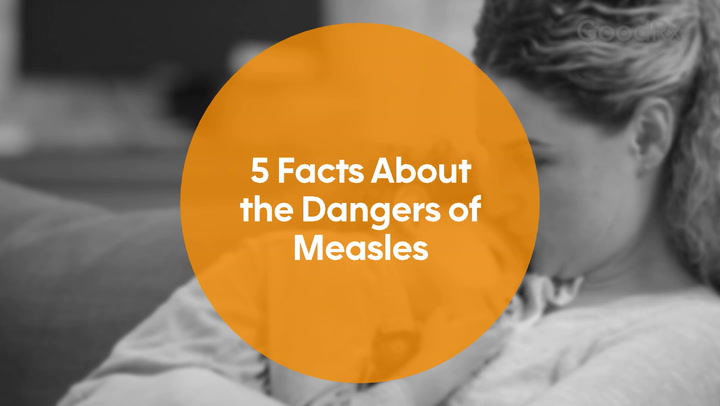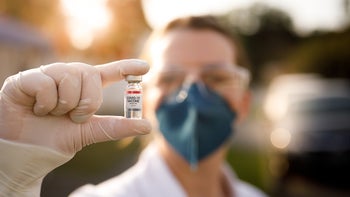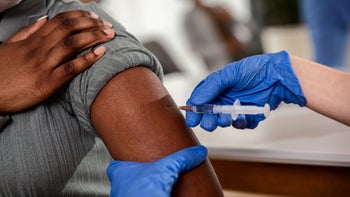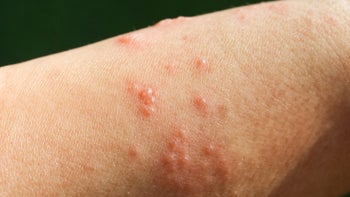
Do I Need a Pneumonia Shot? Here’s Everything to Know About Pneumococcal Vaccines
Key takeaways:
There are five FDA-approved pneumococcal vaccines available in the U.S. They’re available at most medical offices and pharmacies.
Pneumococcal vaccines protect against infections caused by the bacteria Streptococcus pneumoniae, including pneumonia, ear infections, sinus infections, and meningitis.
Pneumococcal vaccines are routinely recommended for young children and adults over age 50. Which pneumococcal vaccine you need, and when you should get it, depends on your age and whether you have certain medical conditions.
Access savings on related medications
Table of contents

Staying up to date on pneumococcal vaccinations helps keep you and those around you healthy. These vaccines lower the risk of developing pneumococcal infections such as pneumonia, sinus infections, and ear infections. But trying to figure out which pneumococcal vaccine to get and when it's recommended can be puzzling.
There’s currently five pneumococcal vaccines available in the U.S. For the most part, they differ in how many strains of pneumococcus bacteria they protect against. Which pneumococcal vaccine you may receive largely depends on your age, if you’ve received any pneumococcal vaccines in the past, and health conditions you may have.
What are the different types of pneumococcal vaccines?
There are five FDA-approved pneumococcal vaccines:
Prevnar 13 (PCV13): 13-valent pneumococcal conjugate vaccine
Vaxneuvance (PCV15): 15-valent pneumococcal conjugate vaccine
Prevnar 20 (PCV20): 20-valent pneumococcal conjugate vaccine
Capvaxive (PCV21): 21-valent pneumococcal conjugate vaccine
Pneumovax 23 (PPSV23): 23-valent pneumococcal polysaccharide vaccine
Capvaxive is the newest pneumococcal vaccine. It was FDA approved in 2024. Vaxneuvance and Prevnar 20 are also relatively new, having gained approval in 2021. They joined Prevnar 13 and Pneumovax 23, which have been available for years.
Pneumococcal vaccines protect against a bacteria called Streptococcus pneumoniae, or pneumococcus for short. Although there are many viruses, bacteria, and fungi that cause pneumonia (an infection in the lungs), pneumococcus is the most common cause. Pneumococcus can also cause infections in other parts of the body.
What is pneumonia, anyway?
Pneumonia is an infection of the lung tissue that can cause shortness of breath, cough, and fever. Young children, older adults, and people with weakened immune systems are at greater risk, but anyone can get pneumonia — even those who are young and healthy.
Lower respiratory tract infections: Find out how pneumonia, bronchiolitis, and bronchitis differ — and how to manage each of them.
Can’t stop coughing? Learn how to tell when a cough may actually be a sign of pneumonia.
Who should get PCV20? Discover how Prevnar 20 differs from other pneumococcal vaccines and if you’re a candidate to receive it.
Pneumococcal vaccines don’t protect against all types of pneumonia, but they protect against the most common bacterial cause.
Other types of pneumococcal disease
Pneumonia vaccines protect against pneumococcal infections in other parts of the body as well. These infections include:
Otitis media, an infection in the middle part of the ear
Sinusitis (sinus infection), which is often first caused by a virus, and can develop into a bacterial infection
Meningitis, an infection of the leptomeninges (tissue surrounding the brain and spinal cord), which can be life-threatening
Bacteremia, a potentially life-threatening infection caused by pneumococcus in the bloodstream
Read more like this
Explore these related articles, suggested for readers like you.
How do the pneumonia vaccines work?
Like all vaccines, pneumococcal vaccines work by showing the immune system a version of the germ that’s responsible for an infection. A pneumococcal vaccine contains part of the pneumococcus bacteria’s outer shell, made of molecules called polysaccharides. The immune system learns to recognize it, attack it, and defend the body against it — should it ever come into contact with the real bacteria in the future.
The body does this by making antibodies against the shell of the pneumococcus bacteria. These antibodies stay in your bloodstream as part of your immune system. If you’re exposed to pneumococci in the future, the antibodies recognize the bacteria’s shell and launch a targeted defense.
There are different strains of pneumococcus, though. The vaccines are made up of molecules from many of those strains.
Good to know: The pneumococcal polysaccharide vaccine (Pneumovax 23) contains polysaccharide molecules that match up with several strains of pneumococcal bacteria. Pneumococcal conjugate vaccines contain polysaccharides too, but they’re also attached to a protein. This addition of a protein allows conjugate vaccines to bring about a longer-lasting immune memory, which translates to a faster and larger immune response.
Which pneumonia vaccine is best?
There is no “best” pneumococcal vaccine. The five available pneumococcal vaccines are different, and which one is best for you depends on how old you are and whether or not you have certain medical conditions.
The main difference between the pneumococcal vaccines is the number of pneumococcus strains they protect against:
Prevnar 13: Contains polysaccharides from 13 types of pneumococcal bacteria; it can be given to adults and children, but it has mostly been replaced in practice by Vaxneuvance, Prevnar 20, and Capvaxive
Vaxneuvance: Contains polysaccharides from 15 types of pneumococcal bacteria and is given to adults and children
Prevnar 20: Contains polysaccharides from 20 types of pneumococcal bacteria and is given to adults and children
Capvaxive: Contains polysaccharides from 21 types of pneumococcal bacteria and is only given to adults
Pneumovax 23: Contains polysaccharides from 23 types of pneumococcal bacteria and is mainly given to older adults and children with certain medical conditions
Who needs a pneumococcal vaccination?
Pneumococcal vaccinations are recommended for most children and adults — with some exceptions based on age and medical history. These recommendations come from the Advisory Committee on Immunization Practices (ACIP) and CDC.
Note: These recommendations can be hard to keep track of. Don’t worry about remembering all the details on your own. A healthcare professional can help you stay on schedule and make sure you get the right shots. You can also refer to the ACIP immunization recommendations for more information.
Children
A pneumococcal vaccination is recommended for all children under 5 years old. Which specific vaccine or vaccines children get depends on their health.
All children should receive Vaxneuvance or Prevnar 20. They need a total of four doses, staggered throughout infancy. The first three doses are given at ages 2, 4, and 6 months. The fourth dose is given between 12 and 15 months.
There’s one added layer of complexity. For children with certain medical conditions who received Vaxneuvance for their initial 4-dose series, they may need a dose of Prevnar 20 and/or Pneumovax 23 after they turn 2. These medical conditions include:
Heart, lung, liver, or kidney disease
Cancer
Asplenia (absence of the spleen)
Having received an organ transplant
Impaired immune system
Cochlear implants (surgically implanted devices to improve hearing)
Cerebrospinal fluid (CSF) leaks (when CSF leaks from the space around the brain and spinal cord)
Adults under age 50
Most adults age 19 to 49 don’t need a pneumococcal vaccination. This is true unless you smoke cigarettes or have certain medical conditions, such as:
Heart, lung, or liver disease
Diabetes
Alcoholism
Impaired immune system
Chronic kidney failure
Cancer
Having received an organ transplant
Sickle cell disease
HIV
Asplenia
CSF leaks
Cochlear implants
Younger adults who do qualify for a pneumococcal vaccine should receive Vaxneuvance, Capvaxive, or Prevnar 20 if they’ve never had a pneumococcal vaccine or don’t know their vaccination history.
If you get Prevnar 20 or Capvaxive, you don’t need any additional pneumococcal vaccinations after that. But if you get Vaxneuvance, you also need to get Pneumovax 23. The two vaccines are typically given 1 year apart.
Adults age 50 and older
All adults age 50 and older should receive a pneumococcal vaccine if they've never had one or don’t know their vaccination history. Vaxneuvance, Capvaxive, or Prevnar 20 are the preferred choices.
If you get Prevnar 20 or Capvaxive, you don’t need any additional pneumococcal vaccines after that. But if you get Vaxneuvance, you’ll also need to get Pneumovax 23. These vaccines are typically given at least 1 year apart.
How often do you need to get a pneumococcal vaccination?
Sometimes, vaccines require a booster shot. This means that an additional shot is given after the initial one(s) to make sure that you don’t lose immunity over time.
In some cases, people who receive Pneumovax 23 will need a booster shot. This depends on when and why it was given. Common scenarios are as follows:
Children who get Pneumovax 23 due to certain health conditions, such as cancer or conditions that weaken the immune system, need a booster with Pneumovax 23 or Prevnar 20 about 5 years after the first dose.
Younger adults with a weakened immune system or other specific conditions should receive a booster with Prevnar 20 or Capvaxive if it’s been 1 year since their last dose of Pneumovax 23. This timeframe can stretch to 5 years if you’ve also received Prevnar 13 before.
Adults over 50 who’ve only ever received Prevnar 13 or Pneumovax 23 should receive a dose of Prevnar 20 or Capvaxive. This is given at least 1 year after your Prevnar 13 or Pneumovax 23 dose.
Adults who received Prevar 13 and Pneumovax 23 before age 65 should get a booster once they’ve turned 65 and it’s been 5 years since the dose of Pneumovax 23. The booster should be Prevnar 20 or Capvaxive.
How effective are pneumococcal vaccines?
Pneumococcal vaccines are very effective at preventing pneumonia and other pneumococcal diseases in adults and children. Getting vaccinated not only protects you from getting pneumonia and other types of pneumococcal disease, but it also protects vulnerable people around you who can’t get a shot.
For instance, prior to FDA approval, studies compared the effectiveness of Vaxneuvance and Prevnar 20 with Prevnar 13. The results showed that the new vaccines are just as effective as Prevnar 13 in triggering antibody production. They also found that the new vaccines protect against invasive disease.
Pneumovax 23 is also highly effective and protects at least 50% of healthy adults from invasive pneumococcal infections.
Are pneumococcal vaccines safe?
Yes, pneumococcal vaccines are safe. Like all vaccines, they go through rigorous scientific testing and review.
Although pneumococcal vaccines can cause mild side effects, severe reactions are rare. For instance, prior to FDA approval, experts studied Prevnar 20 and Vaxneuvance for safety. Six studies with a total of about 4,500 people looked at the safety of Prevnar 20. Across all studies, less than 2% of people reported a serious adverse event 6 months after getting Prevnar 20. This is similar to what was seen in people who got Prevnar 13.
If you have questions about whether the pneumococcal vaccines are safe for you, talk to a healthcare professional.
What are the common side effects of pneumococcal vaccines?
All pneumococcal vaccines can cause mild side effects. The pneumococcal vaccines are given in the arm and are injected into muscle. Children and adults may experience arm soreness, swelling, or redness where the shot was injected.
Other side effects that may occur in adults include:
Fatigue
Fever
Chills
Headache
Decreased appetite
Joint pain
Muscle aches
Children may experience:
Fever
Fussiness
Drowsiness
Decreased appetite
The good news is that these side effects should resolve on their own within a few days.
Good to know: Prevnar 13, Vaxneuvance, and Prevnar 20 may raise the risk of febrile seizures if given to children at the same time as an annual flu shot. These seizures are caused by a high fever and occur in up to 5% of children under age 5. They can be scary but don’t cause any long-term health problems.
Where can you get a pneumococcal vaccination?
Once you decide to get vaccinated, you may wonder where to get it. These vaccinations are commonly available at medical offices and hospitals, so you might be able to get one where you see your healthcare professional. Otherwise, many pharmacies, including CVS and Walgreens locations, have the vaccines. Your local health department is also a good resource and often gives vaccinations, as well.
How much does it cost to get vaccinated?
For adults over age 65, Medicare Part B should cover the cost of pneumococcal vaccines.
If you have private insurance or Medicaid, this should also be true. Usually, routinely recommended vaccinations, like those for pneumonia, are covered by insurance companies without any copays or coinsurance. This means you can often get vaccinated at little or no cost. But make sure to check with your individual plan to confirm that the vaccines are covered.
If you need to pay out of pocket for a vaccination, you can review prices for Prevnar 13, Vaxneuvance, Prevnar 20, Capvaxive, and Pneumovax 23 with GoodRx.
Frequently asked questions
Yes, you can still get pneumonia even if you had the recommended pneumococcal vaccinations. There are many bacteria, fungi, and viruses that can cause pneumonia. The pneumococcal vaccines do not protect against all causes of pneumonia, but they do defend against the most common ones, such as certain types of Streptococcus pneumoniae bacteria.
No. Unlike flu shots, pneumococcal vaccines aren’t given every year. For most healthy adults, only one or two shots are necessary. For healthy children, vaccination is complete by the age of 15 months. People with certain health conditions may need extra vaccinations, but not every year. A healthcare professional can help you determine the right vaccination schedule for you or your child.
No, pneumococcal vaccines don’t contain live bacteria, so they can’t cause an infection. They won’t cause pneumonia or other pneumococcal diseases. If you don’t feel well after being vaccinated, you should discuss your symptoms with your healthcare professional to find out whether they’re related to the vaccine or caused by another illness.
The bottom line
Pneumococcal vaccinations help lower the risk of pneumococcal infections in children and adults. There are currently five pneumococcal vaccines available in the U.S. Which pneumococcal vaccine is recommended is largely based on age, previous pneumococcal vaccination status, and medical conditions you may have. Pneumococcal vaccines are safe but can cause mild side effects like injection site pain and swelling.
Why trust our experts?



References
Brain Foundation. (2019). Spinal cerebrospinal fluid (CSF) leak.
Centers for Disease Control and Prevention. (2023). Administering pneumococcal vaccines.
Centers for Disease Control and Prevention. (2023). Pneumococcal conjugate vaccine (interim) VIS.
Centers for Disease Control and Prevention. (2024). About pneumococcal disease.
Centers for Disease Control and Prevention. (2024). About pneumococcal vaccines.
Centers for Disease Control and Prevention. (2024). How to pay for vaccines.
Centers for Disease Control and Prevention. (2024). Pneumococcal vaccination.
Centers for Disease Control and Prevention. (2024). Pneumococcal vaccine recommendations.
Centers for Disease Control and Prevention. (2024). Recommended vaccines for adults.
Centers for Disease Control and Prevention. (2024). Recommended vaccines for children.
Centers for Disease Control and Prevention. (2024). Pneumococcal vaccine timing for adults.
Centers for Disease Control and Prevention. (2024). Summary of risk-based pneumococcal vaccination recommendations.
Centers for Disease Control and Prevention. (2025). ACIP recommendations: Pneumococcal vaccine.
Golos, M., et al. (2019). Conjugated pneumococcal vaccine versus polysaccharide pneumococcal vaccine for prevention of pneumonia and invasive pneumococcal disease in immunocompetent and immunocompromised adults and children. Cochrane Database of Systematic Reviews.
Kobayashi, M., et al. (2022). Use of 15-valent pneumococcal conjugate vaccine and 20-valent pneumococcal conjugate vaccine among U.S. Adults: Updated recommendations of the advisory committee on immunization practices — United States, 2022. Morbidity and Mortality Weekly Report.
National Human Genome Research Institute. (2025). Antibody. National Institutes of Health.
National Institute on Alcohol Abuse and Alcoholism. (2024). Alcohol facts and statistics. National Institutes of Health.
National Institute on Deafness and Other Communication Disorders. (2024). Cochlear implants. National Institutes of Health.
National Institute of Neurological Disorders and Stroke. (2024). Febrile seizures. National Institutes of Health.
U.S. Food and Drug Administration. (2021). Highlights of prescribing information: Prevnar 20 (pneumococcal 20-valent conjugate vaccine), suspension for intramuscular injection.





























